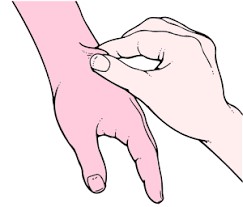A nurse is assessing the skin turgor of an older adult client. In which of the following areas should the nurse lift the skin?
Abdomen
Shoulder
Stomach
Neck
The Correct Answer is D
Choice A reason
Abdomen area is not appropriate: Assessing skin turgor on the abdomen is not commonly performed. The abdomen may not be the most accurate site for assessing skin turgor, especially in older adults, as it can be influenced by factors such as body fat distribution.
Choice B reason:
Shoulder are is not appropriate: The shoulder is not a typical site for assessing skin turgor. It is generally not used for this purpose, as it may not provide reliable results
Choice C reason:
Stomach is not the correct answer.: Assessing skin turgor on the stomach is also not commonly performed. The abdomen or stomach may not be the most accurate site for assessing skin turgor, especially in older adults.
Choice D reason
When assessing skin turgor in an older adult client, the nurse should lift the skin on the neck to evaluate its elasticity and hydration status. Skin turgor is a measure of skin's elasticity and is commonly used as an indicator of hydration in both adults and older adults.
To assess skin turgor, the nurse will gently pinch a small amount of skin on the back of the client's hand or the front of the chest (sternum). However, since the options listed do not include these areas, the closest alternative for an older adult would be the neck.

Nursing Test Bank
Naxlex Comprehensive Predictor Exams
Related Questions
Correct Answer is A
Explanation
The correct answer is choice A. Deep tendon reflexes 2+. This indicates that the client is receiving the therapeutic effect of magnesium sulfate, which is to prevent seizures by reducing neuromuscular excitability.
Magnesium sulfate is a mineral that is given intravenously to women with preeclampsia, a condition of high blood pressure and protein in the urine during pregnancy, to reduce the risk of seizures or eclampsia. It can also prolong pregnancy for up to two days, allowing drugs that speed up the baby’s lung development to be administered.
Choice B is wrong because 1+ proteinuria via urine dipstick is not a therapeutic effect of magnesium sulfate, but a sign of preeclampsia.
Proteinuria indicates that the kidneys are not working properly and are leaking protein into the urine. Magnesium sulfate does not improve the outcomes for the baby and can cause side effects such as respiratory depression for the mother.
Choice C is wrong because pulse rate 100/min is not a therapeutic effect of magnesium sulfate, but a possible side effect.
Magnesium sulfate can cause vasodilation, which lowers blood pressure and increases heart rate. A normal pulse rate for an adult is between 60 and 100 beats per minute. A pulse rate higher than 100 beats per minute may indicate tachycardia, which can be caused by various factors such as anxiety, dehydration, fever, infection, or medication.
Choice D is wrong because urine output 20 mL/hr is not a therapeutic effect of magnesium sulfate, but a sign of kidney failure. A normal urine output for an adult is between 800 and 2000 mL per day, or about 30 to 80 mL per hour. A urine output lower than 30 mL per hour may indicate oliguria, which can be caused by various factors such as dehydration, blood loss, shock, or kidney damage. Magnesium sulfate can cause renal toxicity if given in high doses or for prolonged periods.
Correct Answer is C
Explanation
Choice A reason:
Arching should not be expected. Arching of the body is not a typical manifestation of bacterial pneumonia. It may be seen in infants with certain conditions such as abdominal pain or neurologic issues, but it is not specific to pneumonia.
Choice B reason:
Drooling should not be expected. Drooling is not a common manifestation of bacterial pneumonia. It may be seen in certain conditions affecting the throat or mouth, but it is not directly related to pneumonia.
Choice C reason:
Fever is the correct answer. Bacterial pneumonia is an infection in the lungs caused by bacteria. When a child has bacterial pneumonia, their body's immune system responds to the infection, leading to inflammation and fever.
Choice D reason:
Steatorrhea should not be expected. Steatorrhea refers to fatty, bulky, and foul-smelling stools and is not associated with bacterial pneumonia. Steatorrhea may be seen in conditions affecting the gastrointestinal system and fat absorption.
Choice E reason:
Tinnitus should not be expected. Tinnitus is the perception of noise or ringing in the ears and is not a typical manifestation of bacterial pneumonia. Tinnitus can be associated with various ear-related conditions or medication side effects, but it is not directly related to pneumonia.
Whether you are a student looking to ace your exams or a practicing nurse seeking to enhance your expertise , our nursing education contents will empower you with the confidence and competence to make a difference in the lives of patients and become a respected leader in the healthcare field.
Visit Naxlex, invest in your future and unlock endless possibilities with our unparalleled nursing education contents today
Report Wrong Answer on the Current Question
Do you disagree with the answer? If yes, what is your expected answer? Explain.
Kindly be descriptive with the issue you are facing.
